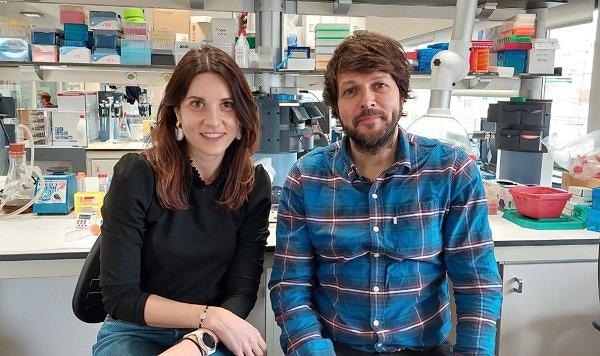Many people have experienced the sudden and unmanageable desire to eat a particular food. These desires, known as cravings, are very usual, especially during pregnancy. The mother’s body passes through a series of physiological and behavioral changes at this stage to create a favorable environment for the embryo’s growth.
 The experts Roberta Haddad-Tóvolli and Marc Claret led a study that provides new evidence on the alterations of the neuronal activity that drive cravings in an animal model. Image Credit: University of Barcelona
The experts Roberta Haddad-Tóvolli and Marc Claret led a study that provides new evidence on the alterations of the neuronal activity that drive cravings in an animal model. Image Credit: University of Barcelona
However, regular consumption of flavorful and high-calorie foods deduced from cravings pertains to pregnancy weight gain and obesity, which can be harmful to the baby’s health.
There are many myths and popular beliefs regarding these cravings, although the neuronal mechanisms that cause them are not widely known.”
March Claret, Lecturer, Faculty of Medicine and Health Sciences, University of Barcelona
Claret was also the IDIBAPS Neuronal Control of Metabolism Group’s leader. Claret co-leads a study in the journal Nature Metabolism with researcher Roberta Haddad-Tóvolli that offers new information on the changes in neuronal action that motivate cravings in an animal model.
Dopamine and compulsive eating behavior
According to the findings, the brain of female mice endures shifts in the functional connections of the brain reward circuits, as well as the taste and sensorimotor centers, throughout pregnancy. Furthermore, female mice, like pregnant women, are more susceptible to sweet foods and establish binge-eating behaviors toward high-calorie foods.
Claret, also being a member of the Department of Medicine of the UB and the Diabetes and Associated Metabolic Diseases Networking Biomedical Research Centre (CIBERDEM), states, “The alteration of these structures made us explore the mesolimbic pathway, one of the signal transmission pathways of dopaminergic neurons. Dopamine is a key neurotransmitter in motivational behaviors.”
The researchers witnessed an improvement in dopamine levels—as well as the activity of its receptor, D2R—in the nucleus accumbens, a brain region associated with the reward circuit.
This finding suggests that the pregnancy induces a full reorganization of the mesolimbic neural circuits through the D2R neurons. These neuronal cells—and their alteration—would be responsible for the cravings, since food anxiety, typical during pregnancy, disappeared after blocking their activity”.
Roberta Haddad-Tóvolli, Researcher, University of Barcelona
The group led by Claret and Haddad-Tóvolli demonstrated that chronic desires have effects on progeny. They have an impact on metabolism and the development of brain circuits that control food intake, resulting in weight gain, anxiety, and eating disorders.
“These results are shocking since many of the studies are focused on the analysis of how the mother’s permanent habits—such as obesity, malnutrition, or chronic stress—affect the health of the baby. However, this study indicates that short but recurrent behaviors, such as cravings, are enough to increase the psychological and metabolic vulnerability of the offspring,” concludes Claret.
The findings of the study could help to update nutritional guidelines for pregnant women to provide optimal prenatal nutrition and avoid disease development. Guadalupe Soria and Emma Muñoz-Moreno (IDIBAPS), Anala Bortolozzi (IIBB-CSIC-IDIBAPS), and Emmanuel Valjent (INSERM and University of Montpelier) were among the participants in this research.
Source:
Journal reference:
Haddad-Tóvolli, R., et al. (2022) Food craving-like episodes during pregnancy are mediated by accumbal dopaminergic circuits. Nature Metabolism. doi.org/10.1038/s42255-022-00557-1.